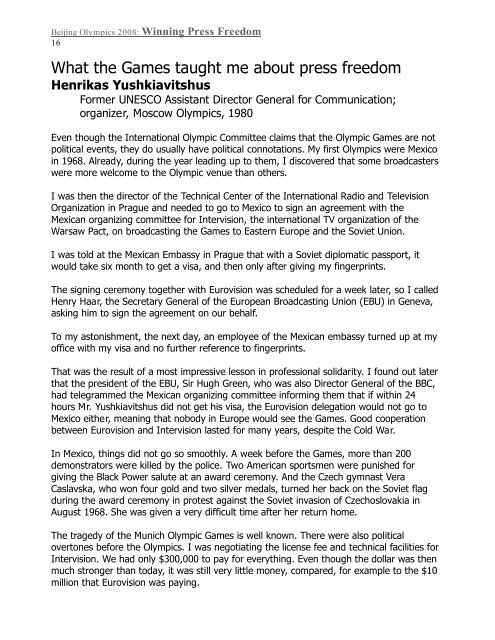Beijing Olympics 2008: Winning Press Freedom - World Press ...
Beijing Olympics 2008: Winning Press Freedom - World Press ...
Beijing Olympics 2008: Winning Press Freedom - World Press ...
You also want an ePaper? Increase the reach of your titles
YUMPU automatically turns print PDFs into web optimized ePapers that Google loves.
<strong>Beijing</strong> <strong>Olympics</strong> <strong>2008</strong>: <strong>Winning</strong> <strong>Press</strong> <strong>Freedom</strong><br />
16<br />
What the Games taught me about press freedom<br />
Henrikas Yushkiavitshus<br />
Former UNESCO Assistant Director General for Communication;<br />
organizer, Moscow <strong>Olympics</strong>, 1980<br />
Even though the International Olympic Committee claims that the Olympic Games are not<br />
political events, they do usually have political connotations. My first <strong>Olympics</strong> were Mexico<br />
in 1968. Already, during the year leading up to them, I discovered that some broadcasters<br />
were more welcome to the Olympic venue than others.<br />
I was then the director of the Technical Center of the International Radio and Television<br />
Organization in Prague and needed to go to Mexico to sign an agreement with the<br />
Mexican organizing committee for Intervision, the international TV organization of the<br />
Warsaw Pact, on broadcasting the Games to Eastern Europe and the Soviet Union.<br />
I was told at the Mexican Embassy in Prague that with a Soviet diplomatic passport, it<br />
would take six month to get a visa, and then only after giving my fingerprints.<br />
The signing ceremony together with Eurovision was scheduled for a week later, so I called<br />
Henry Haar, the Secretary General of the European Broadcasting Union (EBU) in Geneva,<br />
asking him to sign the agreement on our behalf.<br />
To my astonishment, the next day, an employee of the Mexican embassy turned up at my<br />
office with my visa and no further reference to fingerprints.<br />
That was the result of a most impressive lesson in professional solidarity. I found out later<br />
that the president of the EBU, Sir Hugh Green, who was also Director General of the BBC,<br />
had telegrammed the Mexican organizing committee informing them that if within 24<br />
hours Mr. Yushkiavitshus did not get his visa, the Eurovision delegation would not go to<br />
Mexico either, meaning that nobody in Europe would see the Games. Good cooperation<br />
between Eurovision and Intervision lasted for many years, despite the Cold War.<br />
In Mexico, things did not go so smoothly. A week before the Games, more than 200<br />
demonstrators were killed by the police. Two American sportsmen were punished for<br />
giving the Black Power salute at an award ceremony. And the Czech gymnast Vera<br />
Caslavska, who won four gold and two silver medals, turned her back on the Soviet flag<br />
during the award ceremony in protest against the Soviet invasion of Czechoslovakia in<br />
August 1968. She was given a very difficult time after her return home.<br />
The tragedy of the Munich Olympic Games is well known. There were also political<br />
overtones before the <strong>Olympics</strong>. I was negotiating the license fee and technical facilities for<br />
Intervision. We had only $300,000 to pay for everything. Even though the dollar was then<br />
much stronger than today, it was still very little money, compared, for example to the $10<br />
million that Eurovision was paying.





